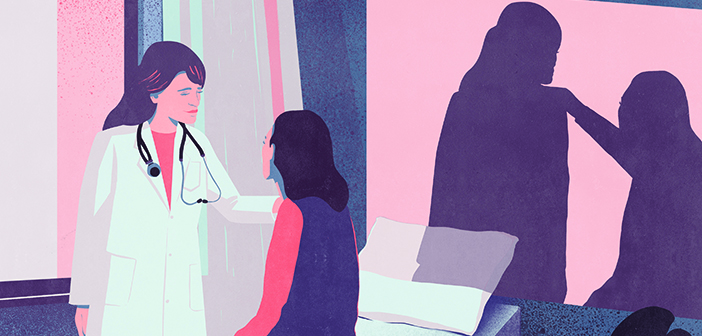Tenacity and humility are necessary to withstand the rigors of medicine.
My early life is a blur of U-Haul trucks and cardboard boxes—not uncommon for a newly immigrated family. Our journey took me to suburban Connecticut, the Caribbean, Miami, the Bronx, and finally, to Washington, DC.
Superimposed onto the backdrop of frequent relocations was domestic strife, which persisted through my teenage years. This was not at all obvious to those around me. Compartmentalizing, I spent high school and the early part of college working hard in my classes, playing soccer, and swapping jokes over bubble tea with my friends.
This all eventually caught up with me: My late teens and early 20s were the most difficult times of my life. It was around this time that I experienced a brief stint in the hospital; though I quickly recovered, I was shaken by my experiences. Then I began medical school and, unsurprisingly, did not excel (to put it lightly). Though I was able to take a year to regroup and have been fortunate to be academically successful since, the impact of these experiences has forever shaped how I aim to practice medicine.
ISOLATED AND VULNERABLE
Medical training and, indeed, practice demand levels of performance so high as to be isolating. To a large degree, this is necessary to serve our patients. But I have come to question whether the degree of invulnerability we require from ourselves and our peers hinders our ability to connect with one another. Perhaps this is particularly unfortunate since we are, in many ways, the only people who can understand the impact of our shared profession on our hearts, minds, way of seeing the world. Perhaps it is particularly unfortunate since we have explicitly chosen a line of work grounded in caring for others at their most vulnerable.
It was isolating, attempting to conceal my challenges from my classmates. Yet I felt there was no way I could be forthright. Perhaps this was in part self-inflicted. Perhaps some may have understood.
This perspective was shaped by my position as a trainee—a young trainee. As a part of my upbringing, I was raised on the virtues of hustle: The personal should never interfere with the professional. The adversity I faced had always been external—the acceptable kind—and it had never affected how I showed my face to the world. I took great pride in my resilience, and as a result of my youthful hubris, mistakenly believed that it was infinite and that I was infallible. The sudden shattering of this illusion stole my sense of self.
Adversity on its own only destroys. Had I received less grace and less support from others, and had I demonstrated less of a stubborn determination to pull through, I would not be on the verge of becoming a doctor. I would have been a story of how adverse early childhood experiences can exact their toll and ultimately derail a life. However, when coupled with resilience, adversity can impart compassion and grit. Perhaps it’ll even throw in some wisdom for all your trouble. I needed to hear, over and over, from mentors whose prescience, clinical facuity, and honesty I trusted that I would be able to succeed. Fortunately, Brown has such faculty in spades.
LEARNING FROM PATIENTS
An older, more measured version of myself can now recognize setbacks, even major, life-altering ones, as painful yet inevitable parts of existence. We regularly inform patients of medical news that changes their perception of themselves with the implicit expectation that, with support, they will adapt to or overcome the unfair pathophysiological barriers imposed upon them. The younger, less experienced version of myself could not recognize the parallel. In my own way, I would need to take inspiration from the patients I so eagerly wished to serve.
In the hospital, the contrast between doctors and patients can seem so stark. Able-bodied and able-minded, highly educated professionals speaking rapidly to each other in their technical jargon. Just another day on the job. They are juxtaposed between bleary-eyed, sometimes cranky, sometimes incapacitated people experiencing what are often the worst days of their lives. Even now, I often find it miraculous that I am in the hospital because I am a soon-to-be doctor and not a patient. I remember what it was like to be on the other side: Seeing suffering in others can stir within me weariness and heartache as I inadvertently recall the worst days of my own life. It’s a constant reminder that my trajectory in life was anything but inevitable.
Naïvely, foolishly, I used to think that the world was divided into those who needed help and those who gave it. As an aspiring doctor, I was in the latter category, obviously. Accordingly, when I stumbled, I lost my sense of self. I needed to realize that the categories I had fabricated were not mutually exclusive.
When I was broken, compassion from others healed me. I was humbled. I am humbled. More than that, I am absolutely determined to pay this kindness forward. To have as much faith in my patients as others had in me. To show as much care to my patients as was shown to me. It’s the least I can do.




